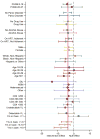Improving Depression Among HIV-Infected Adults: Transporting the Effect of a Depression Treatment Intervention to Routine Care
- PMID: 27668804
- PMCID: PMC5085843
- DOI: 10.1097/QAI.0000000000001131
Improving Depression Among HIV-Infected Adults: Transporting the Effect of a Depression Treatment Intervention to Routine Care
Abstract
Background: Depression affects 20%-30% of people with HIV. Randomized controlled trials (RCTs) have demonstrated the effectiveness of interventions to improve depression among HIV-infected adults, but typically have highly selected populations which may limit generalizability. Inverse probability of sampling weights (IPSW) is a recently proposed method to transport (or standardize) findings from RCTs to a specific external target population.
Methods: We used IPSW to transport the 6-month effect of the Measurement-Based Care (MBC) intervention on depression from the SLAM DUNC trial to a population of HIV-infected, depressed adults in routine care in the United States between 2010 and 2014.
Results: In the RCT, MBC was associated with an improvement in depression at 6 months of 3.6 points on the Hamilton Depression Rating scale [95% confidence interval (CI): -5.9 to -1.3]. When IPSW were used to standardize results from the trial to the target population, the intervention effect was attenuated by 1.2 points (mean improvement 2.4 points; 95% CI: -6.1 to 1.3).
Conclusions: If implemented among HIV-infected, depressed adults in routine care, MBC may be less effective than in the RCT but can still be expected to reduce depression. Attenuation of the intervention effect among adults in routine care reflects the fact that the trial enrolled a larger proportion of individuals for whom the intervention was more effective. Given the burden of depression among HIV-infected adults, more effective interventions to improve depression are urgently needed. However, examining the transportability of trial findings is essential to understand whether similar effects can be expected if interventions are scaled-up.
Conflict of interest statement
The authors report no conflicts of interest.
Figures



References
-
- Bing EG, Burnam MA, Longshore D, et al. Psychiatric disorders and drug use among human immunodeficiency virus-infected adults in the United States. Arch Gen Psychiatry. 2001;58(8):721–728. - PubMed
-
- Ciesla JA, Roberts JE. Meta-analysis of the relationship between HIV infection and risk for depressive disorders. Am J Psychiatry. 2001;158(5):725–730. - PubMed
-
- Zimpel RR, Fleck MP. Depression as a major impact on the quality of life of HIV-positive Brazilians. Psychology, Health & Medicine. 2013 - PubMed
MeSH terms
Substances
Grants and funding
LinkOut - more resources
Full Text Sources
Other Literature Sources
Medical

